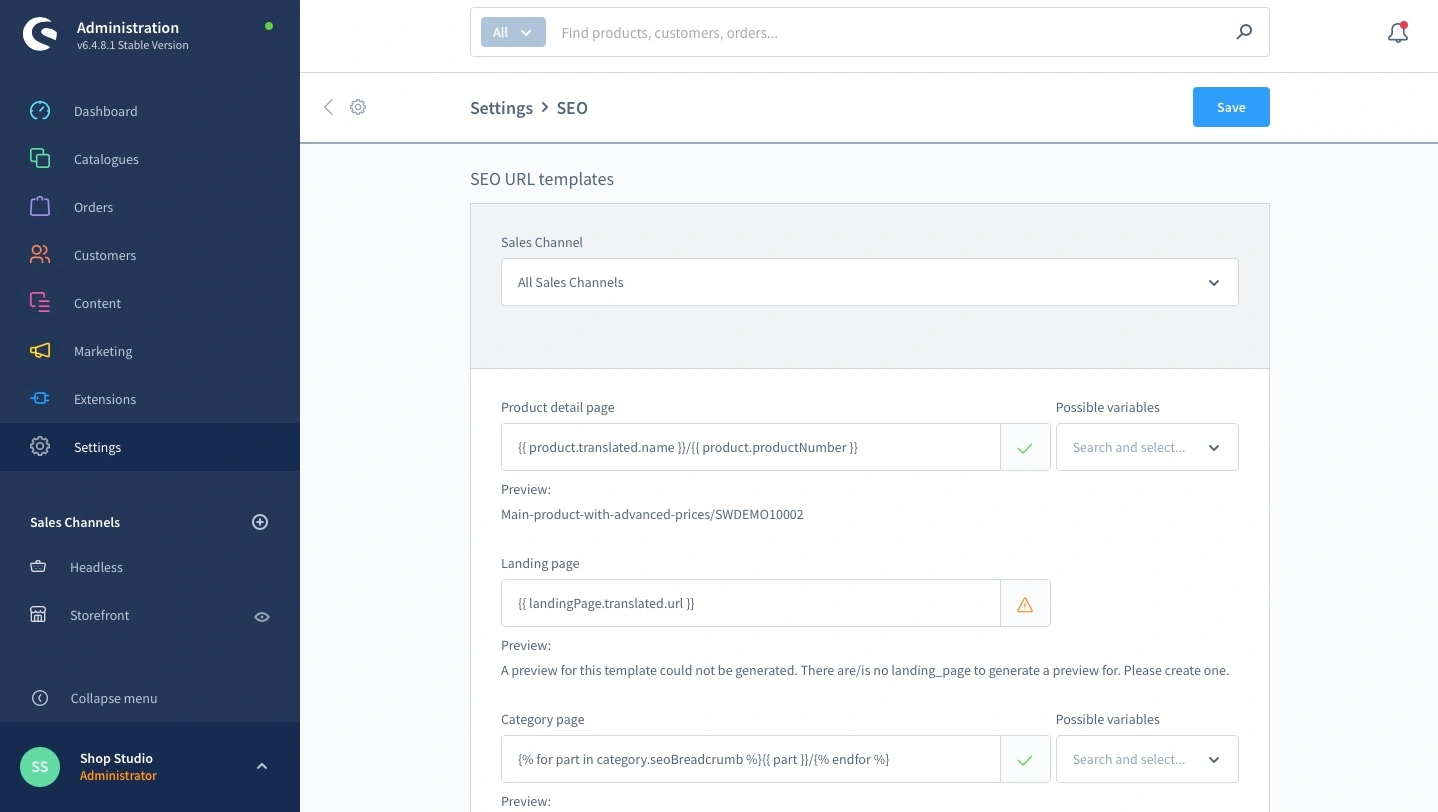Is Shopware 6 SEO optimized?
Are you already have a Shopware store? Or do you currently thinking about starting one? Then take the idea of a good search engine ranking into consideration. SEO is an important part of a modern marketing mix. Whether giant, corporation or small store from a garage beside. Being found in the search engines is important for every company. After all, without SEO you will lose visitors to your store and as a result you will also lose some sales. We are a pure Shopware agency, so we would like to give you a little SEO guide for your Shopware 6 store. Among the Fact, that we are an Agency with experience, we would like to tell you the story of an customer. when we migrated their store from shopware 5 to shopware 6, they were almost able to double their sales. Simply because of search engine results. If that's not fact enough for you, that it' important to work on SEO.But first, for the beginners among us...what does SEO even mean?
What's SEO?
SEO means search engine optimization. Here by one understands all optimization measures. At least the goal is to achieve a better ranking in the search engines. There are On- and OffPage measures. Here it is important to stay tuned. You have to constantly optimize and improve your website. If you are more interested in the topic of SEO, read our blog post "SEO & SEM / How do I promote my Shopware store efficiently?" In this article we will clarify only the measures to optimize your Shopware 6 SEO.The Community Edition of Shopware 6 is already optimized for SEO. However, further steps still need to be taken to improve the ranking. Basically, it' important to know that the optimization of a Shopware 6 store isn't different from any other store system. However, there are different measures, restrictions and possibilities for optimization. Below you will find a list of suitable SEO measures for your Shopware 6 store. All measures are mainly focused on Google. So let's get started with the important stuff.Oh, and before I forget it: Of course, content is also king (or queen) in Shopware 6. 🤓
SEO settings in Shopware 6
Before you start to deal with technical terms like meta data, on-page and off-page optimization, you should start with the URLs of your Shopware store. You can define the structure for your SEO URLs of the categories and product detail pages in the SEO settings in Shopware 6.
SEO-URL Templates
Before you start, you should know that Google's algorithm prefers "talking URLs". This means that your URL should be as meaningful as possible. The visitor of your store directly from the URL should know where in the store he currently is. You can adjust your URL structure under Settings > Shop > SEO. Based on the variables, your URL structure will be created dynamically. This ensures a consistent URL structure. But these changes are only valid for new content.On top there is the item saleschannel. This offers you the possibility to define if the configuration should be done for all or only for one sales channel. Next we come to the product detail page. You can define the template for its URL here. Field two is the **landing page.**By standard, the landing page uses the URL that you assigned in the settings of the landing page. Of course, you can also customize the template of the landing page. The third field is the category page. As default, the category structure in the URL is used here. The last template is the possibility of filters in the URL. For example, filters can be used to capitalize the whole URL. If you want to learn more about filtering in the URL, you can find Twig documentation from Shopware here. All variables must be specified here in Twig format. *Twig-format Example: *Next to the field where you enter the variable, Shopware sill show you if the entered variable works. A green checkmark means everything is correct. An X in red, means that a variable is incorrectly stored and cannot be resolved. Near the SEO URL template you will find a list of different variables. You can easily integrate them with one click.In general, when using variables, please avoid using variables that can lead to regular changes in the URL. Regular changes will have a negative impact on the ranking. 
Change SEO URLs
Have you created a new template, but still have old content that has a different structure? This isn't a problem. In Shopware you can easily change the URL of your existing items on product and category level. By clicking on the text "SEO path" you can activate the inheritance of the SEO structure. Through this, your URL remains rigid and is based on the template.
Redirects
For sure, you will also delete a page in the long run. Still, this page can often be found in the search results. When the searcher then clicks on your URL, he gets to see an EROR page. To avoid this, you should activate a redirect. However, Shopware automatically redirects to your homepage by default. But this will not satisfy your visitors. Therefore, it' better to redirect this page appropriately.You sometimes also delete a page and replace it with a similar one. For example, with a product that you had in your assortment for a long time and now you replace it. You have already collected many backlinks to this product. Here you can add a 301 redirect to the new page, so you don't lose your backlinks. By the way, you should avoid long forwarding chains for SEO. These provide a longer response time and consume valuable crawl budget.Shopware 6 doesn't offer the possibility to configure redirects via backend. These must currently be maintained via .htaccess. But ATTENTION when editing this file. If you make a mistake, you can easily damage the visibility of your store. 💣
Meta Titles and Meta Descriptions in Shopware 6
- The presentation of your Shopware 6 store in search results is determined by meta titles and meta descriptions. That's why meta tags are such an important part of your search engine optimization. But what are they anyway? Let's take a look at the Google search results.
 The search result is created from the information entered here. If no title and description is given, the search engine simply takes the initial text of the page.You can adjust the meta data in Catalogs > Categories > Your store category/shop page > Tab SEO. At the bottom you will find another field "Keywords". This isn't relevant anymore, but is still provided for the completeness. You will not find any templates for the meta descriptions in Shopware 6. The product description is used as standard. Mostly, this is too long for an optimized meta description of maximum 160 characters. Individual editing is necessary therefore.
The search result is created from the information entered here. If no title and description is given, the search engine simply takes the initial text of the page.You can adjust the meta data in Catalogs > Categories > Your store category/shop page > Tab SEO. At the bottom you will find another field "Keywords". This isn't relevant anymore, but is still provided for the completeness. You will not find any templates for the meta descriptions in Shopware 6. The product description is used as standard. Mostly, this is too long for an optimized meta description of maximum 160 characters. Individual editing is necessary therefore. Here are a few more basic rules about meta data:Imagine how a user would search for your store page.Use a main keyword that has the highest relevance on the page.Keep the meta titles always individual for each storeFrom time to time Google changes the maximum length of the meta title. Make sure that the title isn't cropped in the search results.Always add the name of your store at the end.
Here are a few more basic rules about meta data:Imagine how a user would search for your store page.Use a main keyword that has the highest relevance on the page.Keep the meta titles always individual for each storeFrom time to time Google changes the maximum length of the meta title. Make sure that the title isn't cropped in the search results.Always add the name of your store at the end.
Canonical-Tags in Shopware 6
At last duplicate content is something that will negatively affect your ranking. To prevent this, you can use canonical tags. A canonical tag will tell the search engine which page is the "original". This also will be displayed in the search result in the end.Canonical tags are essential for online stores, as duplicate content can arise very quickly. An example is that you have a product in different sizes. In this case, the URL changes, but the content is usually the same.If your store has multiple variants within a product, you will need a corresponding plugin. This is necessary to assign the same canonical tag to all variants. You can edit the URL of your tags under Catalogs > Category or Product > Canonical Urls > SEO Path.
Breadcrumbs
With breadcrumbs, your visitors always know where they are on your page. This allows better orientation and is also useful for search engine optimization of your Shopware 6 store.Shopware 6 has Breadcrumbs installed automatically, so you don't have to configure anything.
Exclude certain pages from crawling
For search engine optimization it's important to exclude certain pages from crawling. Mostly, these are pages that are located in the checkout or customer area. Excluding them is also important in order not to waste crawling budget.We exclude pages using the robots.txt file. This file is a simple text document in which you can define commands and rules for the crawler. The file should always be located in the root directory and also be called robots.txt. You should also define your sitemap in this file. So the crawler gets an optimal overview of the structure of your page. There are pages which can be excluded from search engine indexing by Robots meta tags. In Shopware 6, these must be inserted via the .htaccess. However, this command can also be easily set up in the backend using plugins like SEO Professional.
Sitemap in Shopware 6
Completely irrelevant for most users. For SEO damn important. Sitemaps in form of XML files can be used to give the search engine an overview of all URLs. No additional plugins are necessary for this in Shopware 6, because the sitemap is created automatically by Shopware.You can decide yourself when the sitemap should be regenerated. This can be done individually for each sales channel. In the best case, every time a new URL is added or removed, you inform the search engine about this via the sitemap. Usually a weekly update makes the most sense. But you can also choose a manual update method.
Speed
The page load speed is essential for SEO. Generally, Shopware is one of the faster store systems. Nevertheless, you should consider some points to optimize your loading speed. This includes points such as compressed images, few JavaScripts and fast hosting.
Conclusion: Is Shopware 6 good for SEO?
Shopware 6 has already some good features by default. This will help you to place your store on top of the search results. In these functions you only have to choose the right settings. And BANG, you have laid a good foundation for your SEO. There are also some things where you need an additional plugin. Finally, it can be said: Shopware 6 is a great basis for your SEO success.By the way, if you are interested we can help you with your Shopware 6 shop!
Ready for your E-commerce success?
As Shopware agency, we help you create your high-turnover & individual online store and promote it with ads and SEO.